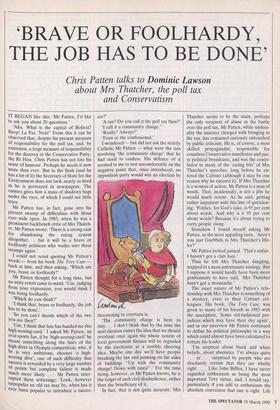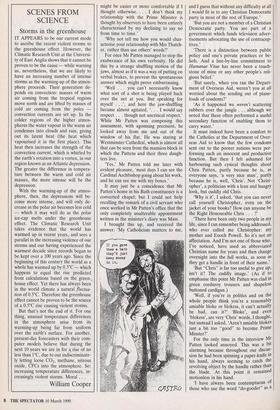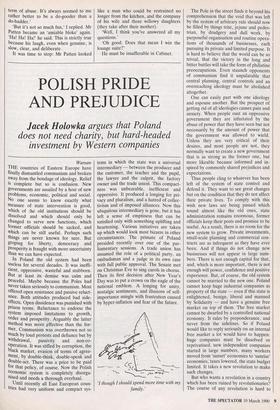`BRAVE OR FOOLHARDY, THE JOB HAS TO BE DONE'
Chris Patten talks to Dominic Lawson
about Mrs Thatcher, the poll tax and Conservatism
IT BEGAN like this: `Mr Patten, I'd like to ask you about 20 questions.'
`Aha. What is the capital of Bolivia? Beep! La Paz. Next!' From this it can be observed that, despite his present measure of responsibility for the poll tax, and, by extension, a large measure of responsibility for the disarray in the Conservative Party, the Rt Hon. Chris Patten has not lost his sense of humour. Perhaps he needs it now more than ever. But in the flesh (and he has a lot of it) the Secretary of State for the Environment does not look nearly as tired as he is portrayed in newspapers. The camera gives him a mass of shadowy bags under the eyes, of which I could see little trace.
Mr Patten has, in fact, gone into his present swamp of difficulties with those eyes wide open. In 1983, when he was a prominent backbench critic of Mrs Thatch- er, Mr Patten wrote: 'There is a strong case for abandoning the rating system altogether. . . but it will be a brave or foolhardy politican who wades into these swamps again.' I could not resist quoting Mr Patten's words — from his book The Tory Case back at him, and then asking, 'Which are you, brave or foolhardy?' Mr Patten thought for a long time, but no witty retort came to mind. 'Urn, judging from your expression, you would think I was being foolhardy.' `Which do you think?' `I think that, brave or foolhardy, the job has to be done.'
`So you can't decide which of the two you are then?'
`Urn, I think that fate has handed me this high-scoring-card.' I asked Mr Patten, an avid sports fan, if by 'high-scoring-card' he meant something along the lines of the high diver in Olympic competition, who, if he is very ambitious, chooses 'a high- scoring dive', one of such difficulty that success is rewarded by a very large number of points but complete failure is made much more likely . . . Mr Patten inter- rupted these witterings: 'Look, however unpopular an old tax may be, when has it ever been popular to introduce a succes- sor?'
`A tax? Do you call it the poll tax then?' `I call it a community charge.'
`Really? Always?'
`Even in the confessional.'
I wondered — but did not ask the strictly Catholic Mr Patten — what were the sins involving 'the community charge' that he had need to confess. His defence of it seemed to me to rest uncomfortably on the negative point that, once introduced, no opposition party would win an election by threatening to overturn it.
`The community charge is here to stay. . . I don't think that by the time the next election comes the idea that we should overhaul once again the whole system of local government finance will be regarded by the electorate as a terribly cheering idea. Maybe one day we'll have people breaking the law and painting on the sides of buildings "Up with the community charge! Down with rates!".' For the time being, however, as Mr Patten knows, he is the target of such civil disobedience, rather than the beneficiary of it.
In fact, that is not quite accurate. Mrs Thatcher seems to be the main, perhaps the only recipient of abuse in the battle over the poll tax. Mr Patten, while undeni- ably the minister charged with bringing in the tax, has remained curiously untouched by public criticism. He is, of course, a most skilled propagandist, responsible 'for countless Conservative manifestos and par- ty political broadcasts, and was the contri- butor to many of the 'caring bits' of Mrs Thatcher's speeches, long before he en- tered the Cabinet (although it may be one reason why he entered it). If Mrs Thatcher is a woman of action, Mr Patten is a man of words. That, incidentally, is not a jibe he would much resent. As he said, getting rather impatient with this line of question- ing, 'Politics, for God's sake, is 95 per cent about words. And why is it 95 per cent about words? Because it's about trying to carry people along.'
Somehow I found myself asking Mr Patten, in the most appalling taste, 'Aren't you just Goebbels to Mrs Thatcher's Hit- ler?'
Mr Patten looked pained. 'That's unfair. I haven't got a club foot.'
Thus he left Mrs Thatcher dangling, trapped in a most unfortunate analogy. But I suppose it would hardly have been more gentlemanly to have said, 'Mrs Thatcher hasn't got a moustache.'
The exact nature of Mr Patten's rela- tionship with Mrs Thatcher is something of a mystery, even to their Cabinet col- leagues. His book, The Tory Case, was given to many of his friends in 1983 with the inscription, 'Some old-fashioned pre- judices which may have their day again', and in our interview Mr Patten continued to define his political philosophy in a way which could almost have been calculated to irritate his leader.
`I'm sceptical about black and white beliefs, about absolutes. I'm always quite . . . er . . . surprised by people who are absolutely certain that they are wholly right. . . . Like John Biffen, I have never regarded enthusiasm as being the most important Tory virtue, and, I would say, particularly if you add to enthusiasm the absolute conviction that one is right. Life might be easier or more comfortable if I thought otherwise. . . . I don't think my relationship with the Prime Minister is thought by observers to have been entirely characterised by my declining to say no from time to time.' • `Why not tell me how you would char- acterise your relationship with Mrs Thatch- er, rather than use others' words?'
For once Mr Patten managed to stop the exuberance of his own verbosity. He did this by a strange shuffling motion of the jaws, almost as if it was a way of putting on verbal brakes, to prevent the spontaneous answer which might prove embarrassing.
`Well . . . you can't necessarily know what sort of a shot is being played back over the net at you. But speaking for myself . .', and here the jaw-shuffling became almost agitated, . . I would say respect . . though not uncritical respect.' While Mr Patten was composing this assessment, with agonising precision, he looked away from me and out of the window of his flat. He was staring at Westminster Cathedral, which is almost all that can be seen from the mansion .block in which the Pattens and their three daugh- ters live.
`Yes,' Mr Patten told me later with evident pleasure, 'most days I can see the Cardinal Archbishop going about his work, and he can see me with my boxes.'
It may just be a coincidence that Mr Patten's home in his Bath constituency is a converted chapel; but I could not help recalling the remark of a civil servant who once worked in Mr Patten's office that the only completely unalterable appointment written in the minister's diary was Mass.
I brought this up, and received the answer: 'My Catholicism matters to me, and I guess that without any difficulty at all I would fit in to any Christian Democratic party in most of the rest of Europe.'
`But you are not a member of a Christian Democratic party. You are part of a government which funds television adver- tisements advocating the use of contracep- tives.'
`There is a distinction between public policy and one's private practices or be- liefs. And a line-by-line commitment to Humanae Vitae has never been a touch- stone of mine or any other people's reli- gious belief.'
`But surely, when you ran the Depart- ment of Overseas Aid, weren't you at all worried about the sending out of plane- loads of condoms?'
`As it happened we weren't scattering rubbers over the jungle . . although we noted that these often performed a useful secondary function of enabling them to carry water.'
It must indeed have been a comfort to the Catholics at the Department of Over- seas Aid to know that the few condoms sent out to the poorer nations were per- forming such an innocent and productive function. But then I felt ashamed for harbouring such cynical thoughts about Chris Patten, partly because he is, as everyone says, 'a very nice man', partly because he is, well, 'Chris'. Not 'Christ- opher', a politician with a lean and hungry look, but cuddly old Chris.
`Why is it', I asked, 'that you can never call yourself Christopher, even on the jacket of your books? How can anyone be the Right Honourable Chris . „ ?'
`There have been only two people in my life, since I can remember being addressed, who ever called me Christopher: my mother and Enoch Powell. So it's not an affectation. And I'm not one of those who, I've noticed, have used an abbreviated Christian name for years and then change overnight into the full works, as soon as they get a handle in front of their name.'
`But "Chris" is far too useful to give up, isn't it? The cuddly image.' (As if to emphasise this point Mr Patten was clad in green corduroy trousers and shapeless buttoned cardigan.) `Well, if you're in politics and on the whole people think you're a reasonably amiable bloke or blokess, it can't actually be bad, can it?"Bloke', and even `blokess', are very 'Chris' words, I thought, but instead I asked, 'Aren't amiable blokes just a bit too "good" to become Prime Minster?'
For the only time in the interview Mr Patten looked annoyed. This was a bit alarming because throughout our discus- sion he had been spinning a paper-knife in his hand, always seeming to catch the revolving object by the handle rather than the blade. At this point it remained motionless in his hand.
`I have always been contemptuous of those who use the word "do-gooder" as a term of abuse. It's always seemed to me rather better to be a do-gooder than a do-badder.'
`But it's not so much fun,' I replied. Mr Patten became an 'amiable bloke' again. `Hal Ha! Ha!' he said. This is strictly true because his laugh, even when genuine, is slow, clear, and deliberate.
It was time to stop: Mr Patten looked like a man who could be restrained no longer from the kitchen, and the company of his wife and three willowy daughters (they take after their mother).
`Well, I think you've answered all my questions.'
`Oh good. Does that mean I win the lounge suite?'
He must be insufferable in Cabinet.




























































 Previous page
Previous page